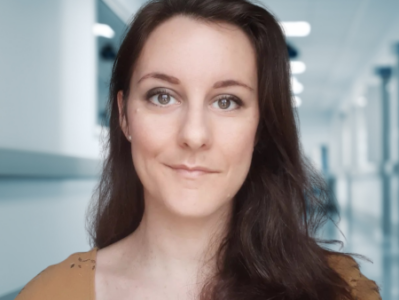A Dal alum’s path to med school
December 11, 2023
Kaylin Dean (BA’19) may have taken a winding path to medical school, but now she’s where she was always meant to be. A first-generation university student, and descendent of the Acadia First Nation, Kaylin scored well on the Medical College Admissions Test (MCAT) on the first try—a rare achievement—and began Dalhousie Medical School at age 30.
A Dalhousie alum, Kaylin graduated with her first degree in performing arts in 2019. She spent years working in customer service and hospitality jobs before considering medical school.
Growing up, becoming a physician wasn’t part of the dialogue in Kaylin’s house. Being the first in her family to graduate from high school and attend university was already a point of pride for her loved ones. Graduate school just wasn’t on the horizon. After a lot of research and even more conversations, though, the narrative in Kaylin’s head changed from, “Could I be a doctor?” to, “I’m supposed to be a doctor’.”
More than Money

Kaylin’s family is wildly proud and supportive of her journey to attend Dalhousie Medical School. Without having had experience with the post-secondary system, however, she’s had to figure out how to get student funding on her own.
“We all know life is getting more and more expensive, and every time I buy something I can’t help but add it to the debt running in my head,” says Kaylin.
Receiving student funding has meant more than just vital financial support.
“That funding helps to feed me, house me, and gets me that coffee when I’m working a night shift in the emergency department. But more than that, it’s knowing someone believes in me, that I am supported, and that I belong,” she says.
Student funding has relieved some of the emotional stress for Kaylin, who hopes to practice family medicine in Yarmouth, the central hub of her Indigenous ancestry.
A Barrier to Success
The health care system in Nova Scotia—like regions around the world—is fraught with challenges, including a shortage of qualified providers, long waitlists for services, and an under-representation of equity-deserving groups in health care. Financial barriers to completing a medical degree are one factor contributing to all these issues.
The average medical school graduate amasses more than $160,000 in debt throughout the course of their studies. That debt affects graduates’ decisions concerning what and where they practice.
With the help of Dalhousie’s generous donors, the Faculty of Medicine is committed to supporting medical students, with a focus on those from underrepresented groups and people wanting to practice in rural areas of the Maritimes.
“The study of medicine is daunting, and a large contributor of that is the financial burden,” says Kaylin. “Costs of living are rising, and it becomes a challenge not to worry about the debt waiting on the other side of the Hippocratic Oath when our focus must be on our training. Scholarships and bursaries are an incredible weight off our shoulders.”
Passionate about education and helping others, Kaylin says she’s dedicated to making donors proud and committed to giving back to her community, just like those who give to support students.
“I’m giving it my all. They bet on the right horse.”
TAGS
